Tumblr has always been the place to go if you need the perfect mix between a microblogging service and a social network. With the constantly changing world of everything digital and user preferences, today — years since its inception — many look for Top Tumblr alternatives that can provide similar functionality or even improve where it lacks.
This article will give the 10 Best Tumblr Alternatives, which users can use for the new platform for self-expression, sharing content, and building communities.
What is Tumblr
Tumblr is a microblogging and social media site created in 2007 that empowers users to post multimedia content to a short-form blog. Users can follow other blogs, repost their blog posts, and really edit their appearance.
Tumblr also has a reputation for people with the biggest communities, represented by fandoms to large art collectives. Probably the most important feature of Tumblr is its flexibility in supporting text, images, GIFs, videos, audio, and more.
Why Choose Tumblr Alternatives
Tumblr is known for its simplicity, flexibility, and ease of sharing and discovering content.
Most people found Tumblr a challenge, at the same time, fluctuation in consumer confidence over changes of content policies and ownership also have made them seek alternatives to the platform in recent years.
Reasons to choose Tumblr alternatives
- Content restrictions: The ban on explicit content from Tumblr in 2018 can be tagged as to why so many users are looking for open platforms right around now.
- Changes in user experience: Some may feel that the most recent updates really degraded the user experience.
- Better or any monetization possibilities: Users wanting more, or simply any, ways to monetize their content might work in a different home.
- Community dynamics: As user bases change, some may seek platforms with different or more active communities.
- Feature sets: Other platforms would come with features that might be best suited for users’ particular needs, features of interest, better analytics, or the ability to integrate with other services.
Key Features to look for in Tumblr Alternative
1. User-Friendly Interface
The best thing about Tumblr’s interface is that it is simple and easy. Look for the below alternatives that it must contain: Ease of Navigation
Content detection should be clean and uncluttered so that you can concentrate on posting and reading content. New users and professional bloggers should find these interfaces user-friendly and easy to manipulate.
2. Multimedia Support
Tumblr can support almost any type of file. The best alternative should be
- Image hosting and galleries
- Video embedding or hosting
- Audio post capabilities
- Text formatting options
- GIF support
3. Customization Options
Another big aspect of using Tumblr is personalization. You’ll want to find platforms that provide the following:
- Customizable themes or templates
- CSS editing for those who know how to wield it
- Ability to change colors, fonts, and layout
4. Social Networking Features
The community aspect of Tumblr is a vital part of what makes it appealing. Look for the following in a Tumblr replacement:
- The ability to follow other users or blogs
- Reblogging or sharing functionality
- Likes, comments, or other engagement features
- Direct messaging or chat options
- Building community is a very important feature for most Tumblr users.
5. Tagging and Categorization
Content organization is the key. So, keep an eye out for:
- Robust tagging system
- Creation and management of categories
- Searchability of the platform
Top 10 Best Tumblr Alternatives
1. WordPress.org
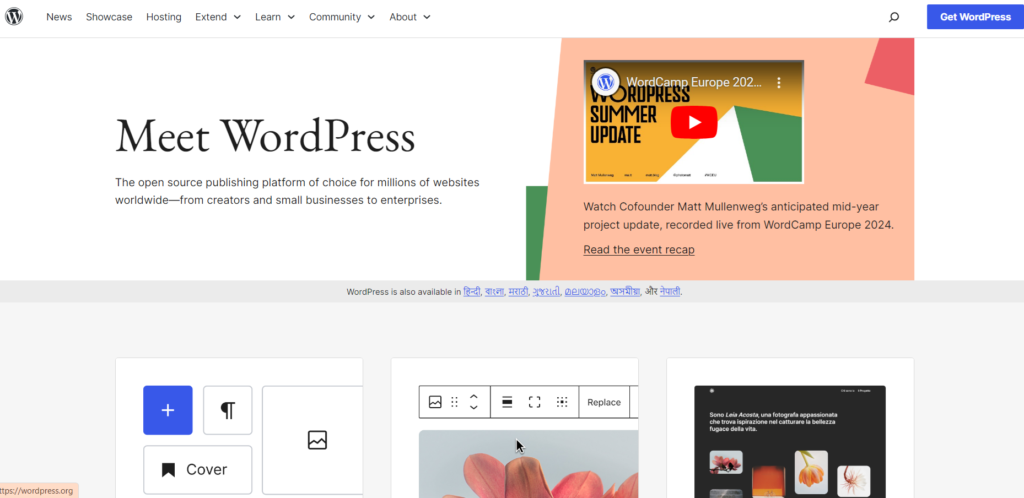
WordPress.org is a free, open-source content management system, running over 40% of all websites on the internet. It is unequaled in terms of flexibility and customization features and can serve from simple blogs to the most complex e-commerce websites.
It offers an elaborate number of themes and plugins that the user can choose in order to come up with nearly any kind of site. WordPress.org is a hosted website that offers full control over content and data.
Key Features:
- Advanced Customization
- With a large plugin and theme ecosystem
- A structure that is perfect for SEO support
- Multi-users
Pros:
- Gives 100% freedom to run anything you want
- Highly Scalable
- Has a large community number that offers support
Cons:
- Requires more technical knowledge
- More costly to host
- The cost of maintenance lies completely with the user
Website: https://wordpress.org
2. Blogger
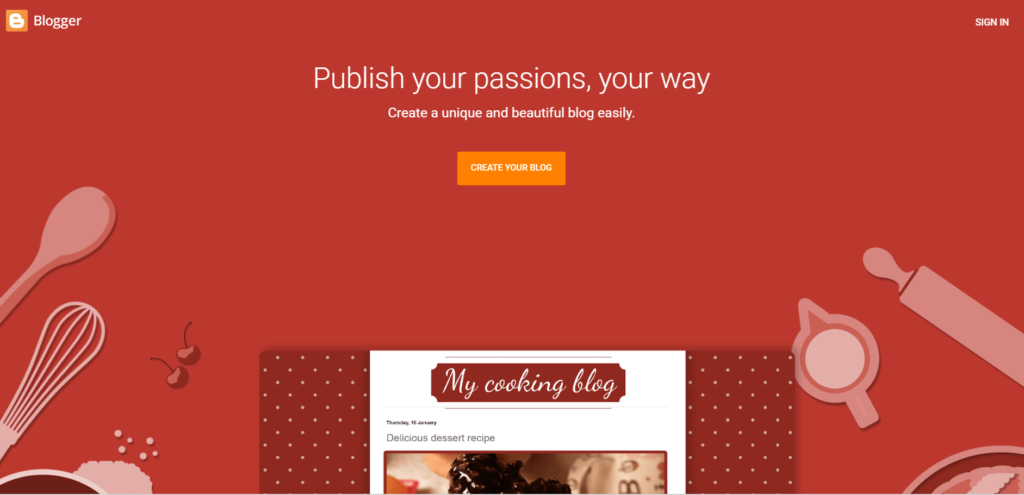
Blogger is a simple, free blog-publishing service from Google, with an easy-to-use web service. With a myriad of simple and easy-to-use features, Blogger provides an excellent way of blogging and serves the best purpose for beginners who want to start their first blogs.
Fully integrated with other Google services, Blogger offers high flexibility to its users. It may not be the best option for complex websites, since it doesn’t offer too many advanced features and settings.
Key Features:
- Simple interface
- Free hosting
- Great for writers
- It can be anything from journal entries and blog posts to articles
Pros:
- Free
- Not your problem to maintain the software and infrastructure
- Easy
Cons:
- Some design limitations
- Advanced customizing
- You don’t hold full control over your data
Website: https://www.blogger.com/
3. Medium
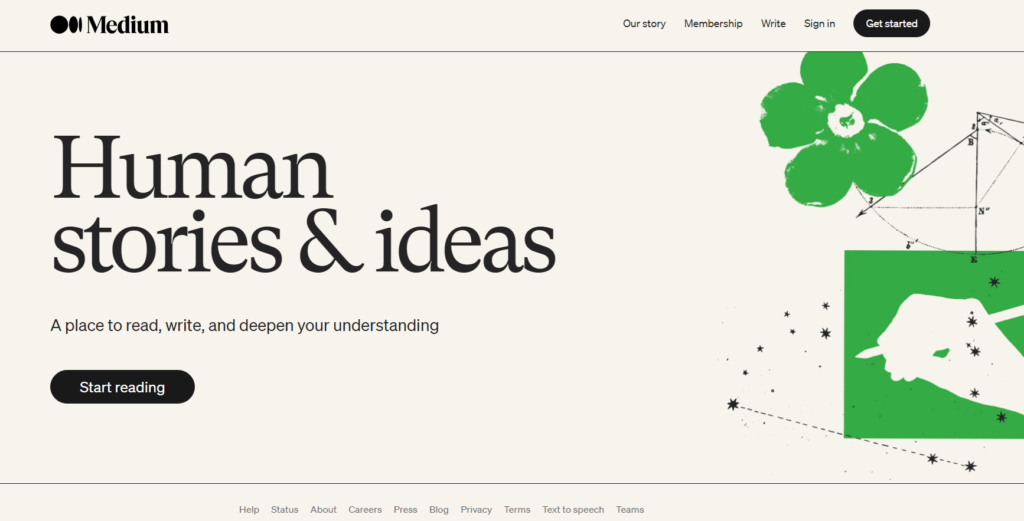
Medium is a place most people go to publish and read lots of words. It follows that clean, minimalist design with a focus on quality content. The benefits of Medium are its built-in, effective distribution of the audience for the writer, and the Partner Program, where writers can earn a little bit of money based on member engagement from their stories.
That said, Medium gives much less control over content presentation compared to self-hosted alternatives.
Key Features:
- Clean reading experience without distractions
- Audience and Distribution
- Monetization with the Partner Program
- Collaboration edition tools
Pros:
- Professional-looking layout
- Opportunity for better reach
- Ease of use
Cons:
- Limited functionality for customization
- Lack of control over content
Website: https://medium.com/
4. Soup.io

Soup.io is a new Tumblr alternative free available, web-based, and used for microblogging, much like Tumblr. It allows you to intuitively share several types of content: text, images, quotes, and links.
A one-of-a-kind feature coming from Soup.io is the “remix” facility to repost while doing slight modifications of content manifested by other users.
It is a more relaxed kind of environment compared to some of its alternatives and, hence, could be a good choice for people who seek out casual blogging experiences.
Key Features:
- Microblogging format
- Remix feature for easy sharing of content
- Support for different types of content
- Customizable themes
Pros:
- Look of Tumblr
- Easy to find content
- Casual, engaging community feel
Cons:
- Smaller user base than many other alternatives
- Limited features at a advanced level
- Not ideal for professional blogging
Website: https://www.soup.io/
5. Mastodon

Mastodon Tumblr alternative is free, self-hosted social networking software that is like Twitter, with some very important differences. It’s made up of different independent servers that can interface between them, giving life to a large single network.
Mastodon is all about user privacy and control—with no ads and no algorithms deciding what a user sees. Sure, it’s far more of a social network than a traditional blogging platform.
Still, the format of microblogging and the community-driven aspect makes it an interesting alternative for many Tumblr users.
Key Features:
- Decentralized network structure
- 500-character post limit
- Strong privacy controls
- Chronological timeline
Pros:
- No ads or algorithms
- User-focused governance
- Active, diverse communities
Cons:
- It can be confusing for new users
- Smaller user base than centralized platforms
- Less suitable for long-form content
Website: https://joinmastodon.org
6. DeviantArt
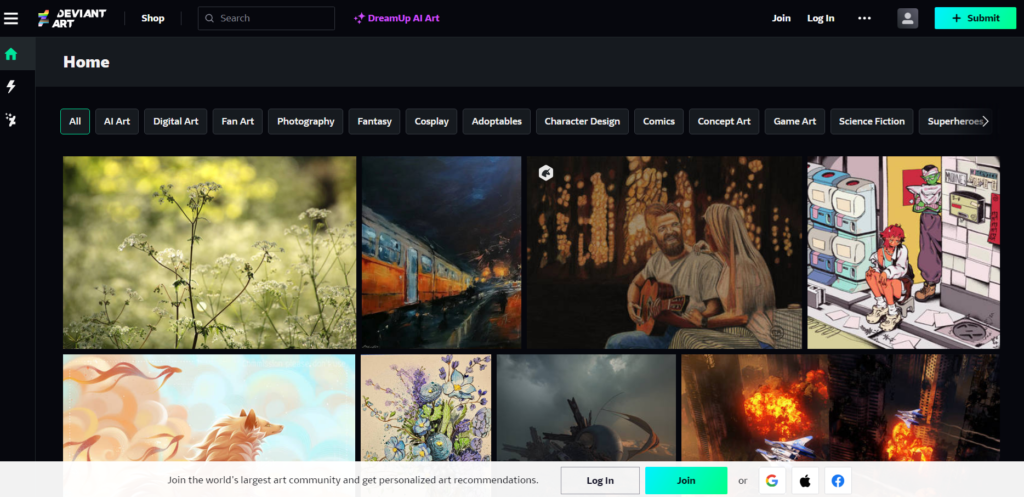
DeviantArt is a site mainly specializing in visual art, but it accommodates other content types as well. It is extremely good for artists and creatives who are looking to share their work and network with others who share the same interests.
DeviantArt has great features for displaying artwork, receiving criticism, and even selling prints of the work or digital downloads. It is much more focused than Tumblr but may be a good alternative for content that is mainly visual.
Key Features:
- Portfolio-style galleries for photographers
- Community feedback system
- Options to sell commissions and prints directly through the site
- Ability to create separate groups and forums to build a community
Pros:
- A large, active community
- Good exposure
- Platform monetizes work
Cons:
- Doesn’t work as well for non-visual work
- It’s a little overwhelming for casual users
- Some features are hidden behind a paywall
Website: https://www.deviantart.com
7. TypePad
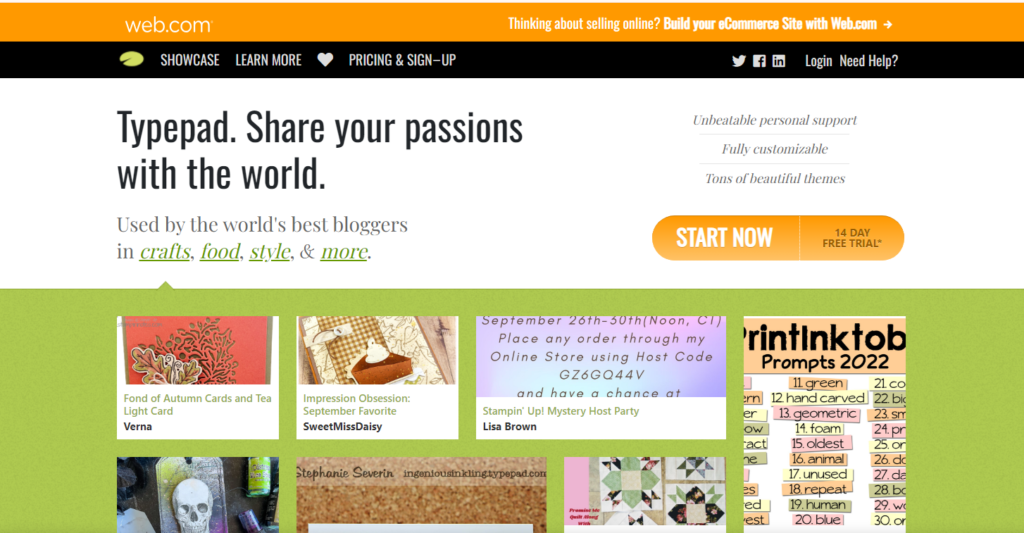
TypePad is a paid blogging platform, being the middle line between practicability and professional characteristics.
It includes the possibility of hosting and designing templates, and it is approachable for beginners yet with enough depth for advanced bloggers.
A particular feature of TypePad is that it is quite reputed for involving reliability with customer support for a relatively hassle-free, less-techie blogging experience.
Key Features:
- Professional design templates
- Built-in analytics
- Mobile ready interface
- SEO Tools
Pros:
- Hosting and support
- Appropriate for all skill levels
- Appealing look
Cons:
- Paid service – no free tier
- Less flexible than self-hosted
- Smaller community than some of its alternatives
Website: https://www.typepad.com
Suggested Read: Top 10 Amazon SES Alternatives
8. Posthaven
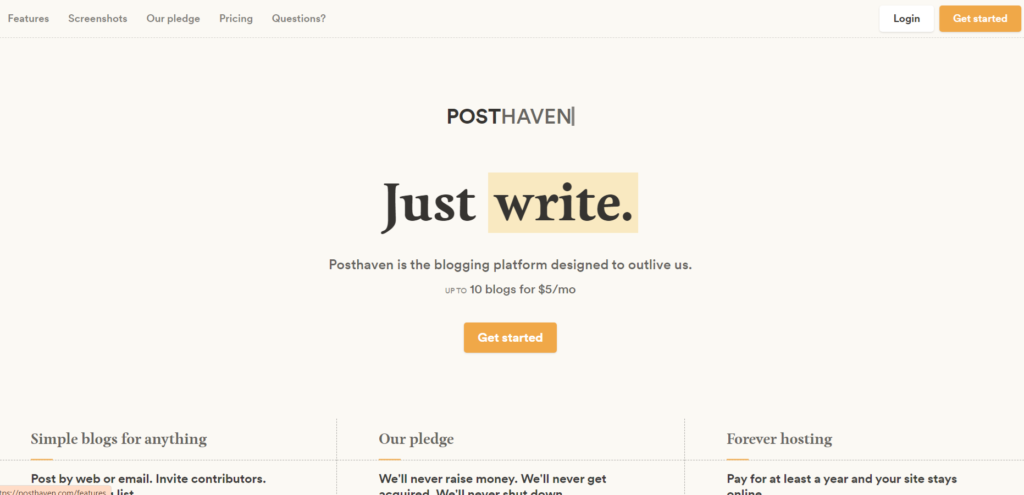
Posthaven was started by some of the people who founded Posterous with the goal of making “permanent” the promise of a blogging platform.
In spirit, it’s something that offers a very basic and no-nonsense approach to blogging, emphasizing longevity and dependability. Posthaven costs a flat fee and does the simple job of keeping your blog online for life.
While it lacks some advanced features, its commitment to permanence may draw in those looking for long-term stability.
Key Features:
- Simple, straightforward interface
- Email publishing feature
- Multiple blog support
- Basic privacy control
Pros:
- Assurance of keeping blog running
- No ads or up-selling
- Simple pricing offered
Cons:
- Limited Theme
- Less in feature as compare to all Alternatives
- Limited User community
Website: https://posthaven.com/
9. Ghost
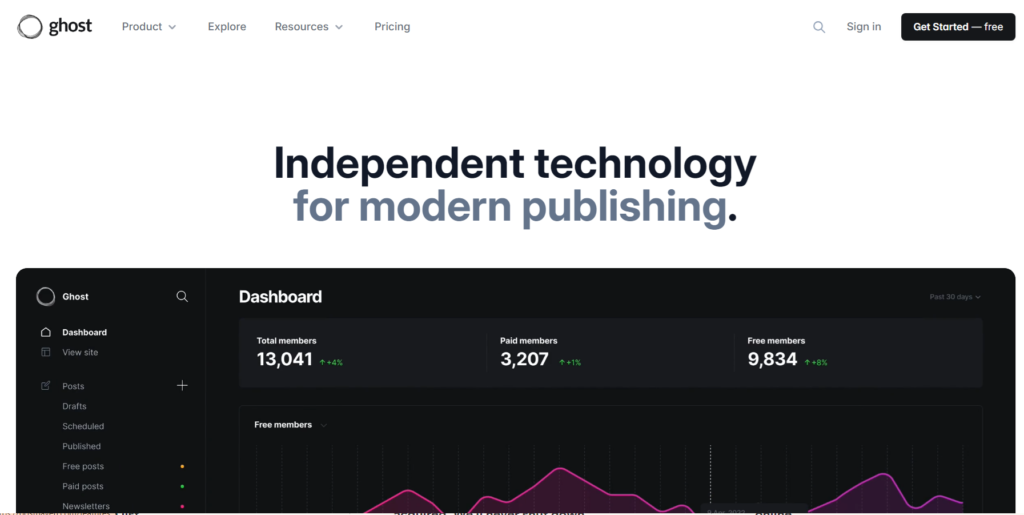
Ghost Tumblr alternative is one of the popular app among social media marketers. Ghost is a publishing platform that is modern and built open-source for bloggers, journalists, and creators of content to create uncluttered, clean writing and publishing environments.
It is professional about SEO and analytics, with built-in membership features meant for publishing and content businesses.
A bit on the technical side compared to some others, but in exchange for that comes flexibility and robust performance.
Key Features:
- Markdown editor
- Built-in SEO and social sharing tools
- Membership and subscription options
- API for custom integrations
Pros:
- Fast and efficient platform
- Great for professional publishing
- No ads or tracking
Cons:
- Steeper learning curve
- Requires self-hosting or paid hosting
- Less suitable for casual blogging
Website: https://ghost.org
10. Pillowfort

Pillowfort is one of the newest platforms; it’s looking to be a mix between Tumblr and LiveJournal, providing some of the features of both blogging and social networking with a great degree of user privacy and control over content.
Users can create communities, share content of various formats, and tweak their blogs, much like all other blogging platforms out there. It’s had slow growth but has attracted users who are looking for a better privacy feature in a Tumblr-like experience.
Key Features:
- Reblogging and commenting
- Community building
- Granular privacy controls over your posts
- Custom CSS
Pros:
- Familiar feel to old Tumblr
- Great focus on user privacy
- Active and growing community
Cons:
- Low user base
- Still in beta, so it’s not super stable
- Support for mobile is limited
Website: https://www.pillowfort.social/
Suggested Read: Top 10 Character AI Alternatives
Conclusion
Any of these Tumblr alternatives apps have features that may appeal to a variety of users, depending on what their actual needs are and personal taste, of course.
You need to factor into consideration things like the nature of the content you would like to create, your level of knowledge in the use of software, your budget, and the required level of control you want over your online presence in deciding which best Tumblr alternative to go with.
FAQs
What Tumblr alternative is best for visual artists?
DeviantArt—ideal for visual artists requiring portfolio style image galleries, and a large art community.
What is best if one wants most control over their blog?
WordPress.org—most flexibility and control while needing self-hosting and being more technical.
Is there something free and easy to use for beginners?
Blogger is free, easy to use, ideal for novices, and is very well-linked with the other Google services.
What option is the most appropriate to ensure your privacy?
Mastodon is right at the top of privacy with decentralization making it have very powerful privacy settings.



